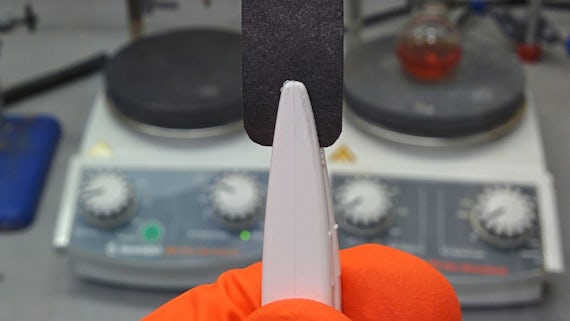Paper supports palladium catalysis: Read all about it!
16 Ionawr 2015

Catalysis offers the opportunity of clean and efficient production of highly valuable chemicals, saving both starting materials and energy and reducing chemical waste. Better catalysts that are easy to recycle and compatible with environmentally friendly procedures are therefore of continuous interest.
A recent publication in the ACS journal Physical Chemistry Letters, resulting from a long-standing collaboration between the research group of Dr Niek Buurma Cardiff University and researchers at the Universidade de Vigo and at CIC biomaGUNE in San Sebastián, shows that filter paper can be used as a robust support for catalytically active palladium nanoparticles.
The Vigo-Cardiff-San Sebastián team found that oleylamine-capped palladium nanoparticles spontaneously self-assemble on paper in a simple dip-coating procedure taking just minutes. The resulting assembly is a remarkably robust catalytic system with high catalytic efficiency and excellent catalyst recyclability. In addition to robustness and recyclability, the paper loaded with palladium nanoparticles showed high versatility and successfully catalysed several different reactions including highly useful C-C bond-forming reactions, even in environmentally friendly aqueous solutions,
Because of the dimensions of the paper strips used, the catalyst is very easy to use and recycle: simply dipping it in and pulling it out from reaction mixtures starts and stops the reaction. In addition, the size of the paper can be easily adjusted to tune the active catalytic area and the flexibility of paper allows the use of reaction containers of arbitrary shapes. The immobilisation strategy is, in principle, applicable to other types of nanoparticles as well and these could thus similarly be used as catalysts in various chemical reactions.
With many unique features, the robust catalysts consisting of nanoparticle-loaded paper developed by the Vigo-Cardiff-San Sebastián team open new avenues for convenient and practical applications of recyclable supported catalysts and these are currently under investigation.
